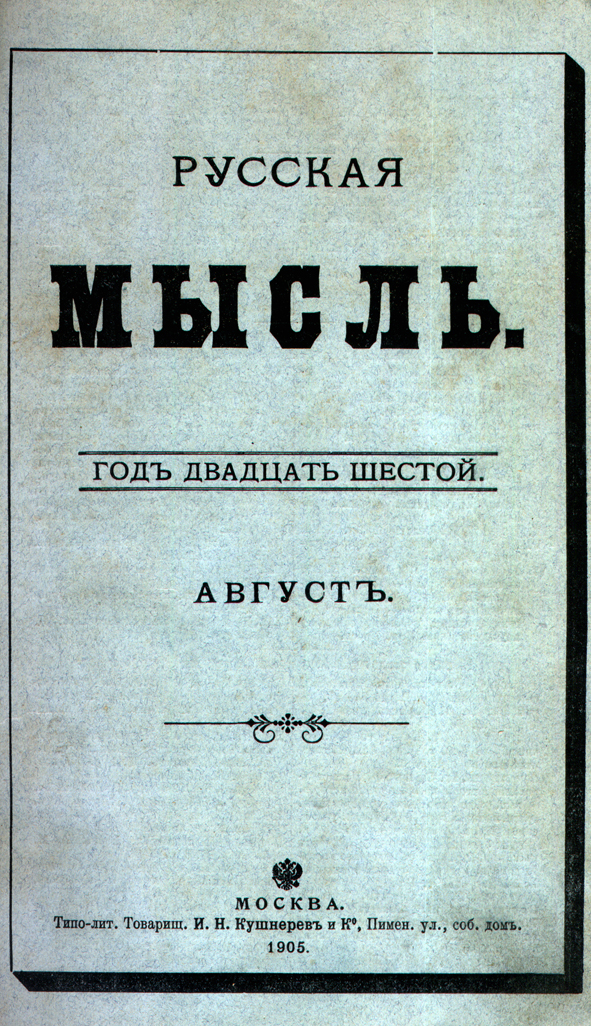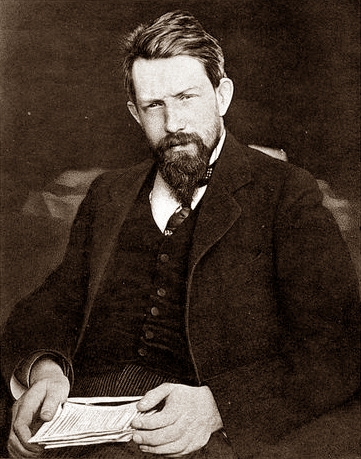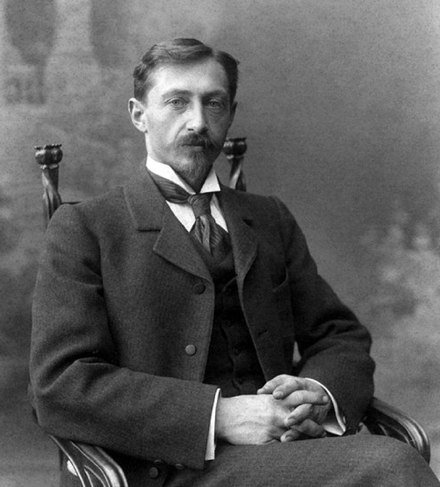Now existing monthly Russian Mind magazine differs from both the original thick magazine and the Parisian weekly newspaper, but we strive to maintain the quality mark inherent in our glorious print
VICTOR LOUPAN, Head of the Editorial Board

The Russian Mind magazine is 140 years old now! Long ago, being a young student, I admired the intriguing title of this print medium. It was in the late 1970s, that the Russian Mind was issued as a weekly newspaper, no longer with an “émigré” bias, but rather with a “dissident”, “human rights” focus. Although at that time the newspaper was still headed by Princess Zinaida Shakhovskaya, whose resonant surname clearly reminded of the “White Guard” origin of the print. But it resembled incorrectly. Because the Russian Mind newspaper, which was established in Paris in 1947 under the guidance of the French Confederation of Christian Workers, was no longer a “White émigré” mass medium with its specific topics, ethics, and aesthetics, but a pan-European Russian-speaking anti-Soviet printed media outlet that played its role during the then beginning Cold War.
Below we will pay more attention to this historical period and its influence on our print medium.
The Russian Mind, the 140th anniversary of which we are celebrating today, differed radically from the aforementioned émigré-focused weekly. It was a thick magazine about literature, politics, and economics that had been published monthly in Moscow since 1880 and was clearly not intended for an “ordinary” reader. The print was established by Vukol Mikhailovich Lavrov, a well-known journalist and publisher.
The Russian Mind issue dated April 1888 lays in front of me, on my desk. Its name “RUSSIAN MIND.” was written just like that, with a dot. And between the name and the word “APRIL.” it contained a clarification, the “NINTH YEAR.”.
The term “thick magazine” has not been usurped. The Russian Mind issued in April 1888 consisted of 600 pages of finely printed text. It is also interesting, that such a thick magazine contains, according to its table of contents, as little as thirteen articles. The first seven of them are pure literature. They include the Canto the Tenth of “Don Juan” by Byron, the story written by Karonin, the story “from the times of Charlemagne” by Felix Dahn, a Frug’s poem, six chapters of the Salov’s novel, some anonymous text signed with initials, and, finally, an excerpt from the masterpiece “On the Niemen” written by Eliza Orzeszkowa, a Polish writer. Let me briefly comment on this publication. Orzeszkowa was a Russian citizen, but a Polish patriot or nationalist. In this novel, she portrays ordinary peasants who remain faithful to the traditions of the Polish anti-Russian uprising of 1863. By the way, she took part in that uprising, and her husband was exiled for an indefinite term for participation, with their estate being confiscated in favour of the government. I like Eliza Orzeszkowa as an author. I especially like her novel “Meir Ezofowicz”. In 1905, she was even nominated for the Nobel Prize, like Leo Tolstoy, but the Prize was granted to Henryk Sienkiewicz.
The fact of publication of the author prejudiced against Russia, in the magazine called “Russian Mind”, is a pretty big deal. First of all, it speaks for itself that the tsarist-era censorship was not that fierce. But this also speaks about the ideological postulate of the medium.

The Russian Mind was one of the most respected intellectual prints of the late 19th century and the early 20th century. Not only respected, but also popular, according to the number of subscribers – it averaged to 14,000 people! This is a lot, especially considering that after literary publications (which were not simple ones, to be honest) the magazine offered terribly long articles on a modern zemstvo system, Schopenhauer’s theory of knowledge, the history of Russian legislation, group struggle and moral ideals, history of women’s education in Russia, the fundamental matter of the oil industry, regression in history, and French positivism. After absorbing those rich issues, the Russian Mind readers probably felt more educated and smarter.
Since its establishment, the Russian Mind has adhered to the “left”, or “liberal”, or, shall we say, “progressive” ideas. The magazine was founded a year before the assassination of Alexander II known as the “Liberator Tsar”. Bombers had blown him up on March 13, 1881, and he was succeeded by very authoritarian and autocratic Alexander III, whose policy was extremely anti-liberal and radically reactionary. Therefore, “constitutionalism” ideas advocated by the Russian Mind, which later gave rise to the Cadet party, were directly opposing to the Russian concept of autocracy.
The magazine continued to be leftist until the 1905 Revolution, which it supported naturally. Then the Russian Mind greeted warmly the February Revolution and the overthrow of the monarchy. In particular, such attitude was expressed by its editor-in-chief Pyotr Berngardovich Struve, who even became a part of the Provisional Government as a director of the department of the Ministry of Foreign Affairs.
But the October Revolution was perceived by the Russian Mind as a catastrophe for the country and it openly called the Bolsheviks “usurpers”. As a result, the Bolsheviks simply ceased the magazine in 1918.
The Russian Mind had not been published at all for further three years. After that, in 1921, the magazine was renewed abroad, but not on a regular basis, with long interruptions due to financial difficulties. The last issue of the thick Russian Mind magazine was published in Paris in 1927.
Over the 1920s and the 1930s, the Russian émigré was very active. Despite the dire financial situation, a lot of newspapers, magazines, and books were published in Russian both in Paris and Berlin. Opposing circles continued their pre-revolutionary disputes and ideological showdowns during their emigration period.
Vasily Vitalyevich Shulgin, a State Duma deputy, whose ideas were associated with the Black Hundred movement and who accepted the renouncement of Nicholas II, recalled one of his lectures devoted to the February Revolution and voiced before the members of the NTS (People’s Workers’ Union, the émigré movement of Russian Solidarists – V.L.), at which Struve was present. After the lecture, the debate began and Struve declared he had the only reason for criticizing Nicholas II, as he was too soft with the revolutionaries, who, according to Struve, had to be “eliminated ruthlessly”. Shulgin jokingly asked if Struve thought of himself to be eliminated this way. Struve exclaimed, being extremely agitated:
– Yes!
And, getting up from his seat, he walked across the hall shaking his gray beard:
– Yes, and I am the first candidate! Exactly! As soon as any revolutionary raises his head – bam! – buttstock on his skull!
That emotional, almost comical scene conveys the atmosphere that prevailed even in the elite circles of the Russian pre-war émigré with amazing accuracy.
After the war, however, the status of the Russian émigré changed dramatically. It became not only inconceivably difficult, but also dangerous to criticise the victorious Soviet Union. The communist parties were at the height of their power in France and throughout entire Western Europe. Those who dared to criticise the USSR in any way were declared Nazis, Hitlerites, and collaborators. And therefore, by 1945 there was practically not a single Russian medium left, except for those promoting a return to their homeland. Finally, there was only a small number of “returnees”, but an entire émigré was under the pressure or influence of the returnee infused propaganda.
However, the triumph of the USSR did not last long in the West, because the Cold War began very soon after the Great Victory. On the one hand, it was a “race of armaments”, but on the other hand, it was a rampant propaganda. It was against this background that the radio stations “Radio Liberty” and “Radio Free Europe” were established, and the Russian Mind newspaper too, which soon became a weekly newspaper taking over the inspiring name of the famous thick magazine.

Vladimir Lazarevsky, a pre-revolutionary Russian journalist, became the first editor of the renewed Russian Mind. It is funny, that before the revolution he worked for the Kievlyanin newspaper owned by aforementioned Vasily Shulgin, who inherited it from his father. Very soon the newspaper became officially funded by the US State Department, and unofficially by the CIA – just like the radio stations residing in Munich.
Lazarevsky served as editor-in-chief until 1953. He was replaced by Sergei Vodov, who headed the editorial office until 1968. That continuous period is remarkable due to many great authors, such as Boris Zaitsev, Ivan Bunin, Ivan Shmelev, Nina Berberova, Gaito Gazdanov and many others whose masterpieces were published on the Russian Mind pages.
From 1968 to 1978 the newspaper was headed by Zinaida Shakhovskaya. This period saw the emergence of the human rights movement in the USSR, which greatly inspired the newspaper. Viktor Nekrasov, a political emigrant, the author of the notable military book “In the Trenches of Stalingrad” and the Stalin Prize laureate, became one of the most “unexpected” authors of the Russian Mind newspaper. And then such authors as Joseph Brodsky, Alexander Solzhenitsyn, Vladimir Maksimov, Andrei Sakharov, Sergey Dovlatov and many others came to light.
Thus undergoing several modifications, the Russian Mind had existed comfortably until 1991, when the USA abruptly stopped its funding. Its editor-in-chief Irina Ilovaiskaya-Alberti started seeking for new sources of funding. And she found them as the Roman Catholic Church and the Soros Foundation… But for a short time only.
By the early 2000s, the Russian Mind newspaper was again on the verge of closure, when it was miraculously saved by Russian businessmen. In 2006, as a part of the “Homecoming” programme, the Paris archives of the newspaper were donated to the Russian State Library and thus saved.
Now existing monthly Russian Mind magazine differs from both the original thick magazine and the Parisian weekly newspaper, but we strive to maintain the quality mark inherent in our glorious print.




